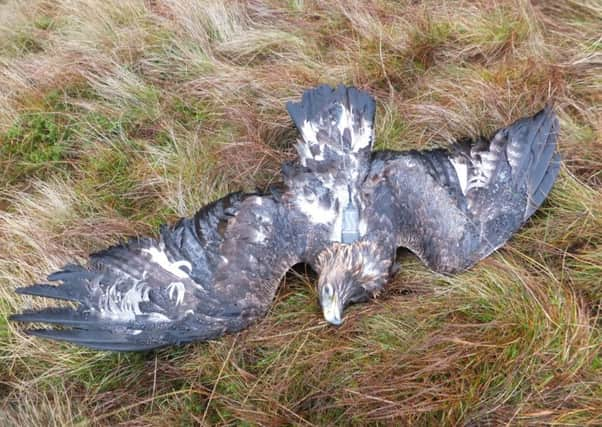New group to consider licensing for grouse shoots


The move comes after new research showed almost a third of golden eagles hatched in Scotland are being illegally killed.
The report analysed the movements of 131 young golden eagles over a 12-year period and found more than 40 had vanished in suspicious circumstances.
Advertisement
Hide AdAdvertisement
Hide AdThe majority of cases centred on areas around grouse shooting estates.
No links were found between fitting tags or the position of wind turbines in the disappearance of the birds.
The study, by Scottish Natural Heritage (SNH), was commissioned after eight birds went missing in the Monadhliath mountains, south-east of Inverness, between 2011 and 2016.
Environment secretary Roseanna Cunningham has said an expert group will be set up to look at managing grouse moors sustainably and within the law.
Following a request by the Environment, Climate Change and Land Reform Committee the group will also advise on the option of licensing grouse shooting businesses.
Ms Cunningham said: “The continued killing of protected species of birds of prey damages the reputation of law-abiding gamekeepers, landowners and indeed the country as a whole.
“Those who carry out these crimes do so in defiance of the will of parliament, the people and their own peers. That must end.”
She says measures introduced over the longer-term will “tackle outdated practices and attitudes”.
Advertisement
Hide AdAdvertisement
Hide AdShe added: “We are sending out a strong message that Scotland’s wildlife is for everyone to enjoy – not for criminals to destroy for their own ends.”
Conservationists have welcomed the enquiry, saying SNH’s findings confirm the scale of the problem.
RSPB Scotland director Anne McCall described the report provides a “clear”, “factual” and “very worrying” picture of crime against raptors.
Ian Thomson, head of investigations for the charity, added: “The irrefutable evidence in this report, demonstrating the scale of systematic, organised criminality, is shocking, and yet it is likely that none of this would have come to light had these birds not been fitted with satellite tags.
“When you add to this the disappearances of satellite-tagged white-tailed eagles, red kites, goshawks, peregrines and hen harriers not included this review, and consider that satellite-tagged birds form a very small proportion of the populations of these species, the overall numbers of eagles and other protected raptors that are actually being killed must be staggering.
“It is long overdue that representatives of the shooting industry stood up and publicly acknowledged the level of crime that is taking place.”
Landowners have given cautious backing to the move, which will examine the environmental impact of grouse moor management practices such as muirburn and culling of mountain hares.
There will also be increased resources for policing wildlife crime and steps to protect the role of gamekeepers.
Advertisement
Hide AdAdvertisement
Hide Ad“We recognise fully the need to maintain efforts to eradicate any persecution of protected bird species, even though such incidents are now at a historically low level,” said David Johnstone, chairman of Scottish Land & Estates.
“There is no question that the few people who continue to engage in such illegal activity are grievously undermining the very valuable social, economic and environmental contribution of grouse shooting to our rural communities.”
He added: “There has been much heated debate over this issue recently and it is essential that whatever action is taken going forward it is based on evidence and clear thinking rather than any inherent prejudice against game shooting.”
Susan Davies, director of conservation for the Scottish Wildlife Trust, said: “This is further proof of the need for a step change in the way our uplands are managed, including the introduction of a licensing system for driven grouse moor management to address wildlife crime and encourage more sustainable stewardship of these areas.”
The Scottish Raptor Study Group delivered a petition to parliament last week, demanding a new shoot licensing system should be set up.